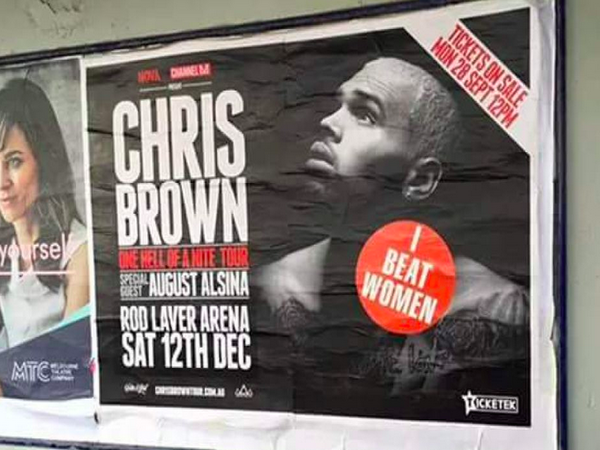Immigration Minister Peter Dutton announced on Sunday that R’n’B artist, Chris Brown, would be denied a visa to enter the country.
This came after Minister for Women Michaelia Cash suggested last week that his application would be considered carefully because of his assault conviction against ex-girlfriend, Rihanna.
The remark was made as Prime Minister Malcolm Turnbull announced the government’s $100 million plan to combat violence against women.
The announcement was initially met with much support.
Mamamia said they were proud of the outcome.
“Young Aussies need to be reminded at every opportunity that violence against women is never okay,” the publication said.
The decision comes after VicHealth released a report that revealed young people aged 15 to 24 show a higher level of attitudinal support for violence against women than those aged 35 to 64 years.
It also revealed that 15 to 24-year-olds have a lower level of understanding that violence is more than physical violence and forced sex, and are less likely to support gender equality relationships.
Advocacy group, GetUp!, received more than 14,000 signatures on their petition, ‘No Chris Brown. You’re not welcome in Australia’.
“By turning a blind eye to his tour, we send a message to survivors of family violence that ‘it’s not that important’ and that ‘you should just get over it’,” the petition reads.
Campaign director, Kelsey Cooke, said the move to ban Brown from entering Australia is larger than the artist himself.
“Consider this a campaign against any and all perpetrators of violence – with the hope that Chris Brown’s example will enforce the precedent of sticking to the character test guidelines in future,” she said.
“It has very little to do with the pop star, and everything to do with how seriously we take domestic violence, and what we as a culture are willing to turn a blind eye to.”
Whoever is doing this to the Chris Brown posters in Melbourne is a champion! Nice work! pic.twitter.com/P7ueyDVWxs
— Stephanie McCarthy (@tallpunksteph) September 22, 2015
However, Australian writer, Clem Bastow, said the issue isn’t as straightforward as some might think.
She has described GetUp!’s campaign as a reflection of society’s prejudice against gangster rap music culture, and its ability to promote perceptions about the types of people who are violent towards women.
“It’s time to turn the spotlight on the abuse and misogyny inherent in this country – in our own sports and entertainment industries,” she said.
This comes just days after reports a mother and her 18-year-old daughter were harassed by ex-Geelong Football Club player and media personality, Billy Brownless, at a junior football function.
Brownless, who was hosting the event, announced “here come the strippers”, as the mother and daughter walked through the venue.
The comment was met with widespread laughter throughout the crowd.
Brownless defended his actions, saying it was just a throwaway line.
“I didn’t mean anything by it,” he said.
The mother, who has refused to be named, described the incident as football’s “thug” culture. She was particularly disappointed that her daughter had been subjected to such harassment.
“[The fact] that women can still be the brunt of a joke like that is just so degrading. We are trying to teach our children to be respectful. It was a horrendous thing for my daughter to have to hear,” she said.
VicHealth CEO, Jerril Rechter, believes the portrayal of abusers in pop culture can be directly attributed to a young person’s attitude towards women and gender roles in relationships.
“Their attitudes reflect back to us the messages they receive in our culture and society more broadly,” Rechter said.
“If we want to change attitudes, we need to address the influences that shape them, the way we rear boys and girls, the way relationships between men and women are shown in the media and popular culture, and the position our leaders take on this issue.”
Writer for The Guardian, Jeff Sparrow, also criticised the government’s announcement, saying it highlighted Australians’ attitudes towards race and stereotyping.
He said the announcement about Brown’s visa has diluted the core issues of domestic violence.
“At best, a ban on Brown is a distraction, a cheap headline-grabbing stunt that takes the focus away from the real work – and the allocation of real resources – necessary to make women safe,” he said.
“Quite obviously, the perpetrators of domestic violence in Australia are everyday Australians, not foreign musicians.”
In Turnbull’s address, he said we need to make it “un-Australian” to disrespect women.
“Disrespecting women does not always result in violence against women, but all violence against women begins with disrespecting women,” he said.
However, as Brownless’ comments would indicate, the issue is very much a home grown problem.
While refusing entry to Brown is clear action against domestic violence, we need to change perceptions about what it means to be a perpetrator.
 Tiyana Matliovski is a third-year Bachelor of Journalism student at La Trobe University and a staff writer at upstart magazine. You can follow her on Twitter: @tiyana_m88.
Tiyana Matliovski is a third-year Bachelor of Journalism student at La Trobe University and a staff writer at upstart magazine. You can follow her on Twitter: @tiyana_m88.







